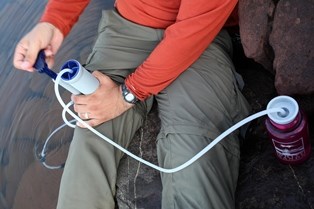Stay HydratedDehydration is a serious concern, especially when hiking inland like along the Greenstoe Ridge Trail. Drink plenty of water and eat salty snacks. Campgrounds are the best places to find water to purify in the backcountry. Carry enough water for your planned mileage. Start hikes early and seek shade when needed. 
NPS Potable (Treated) WaterPotable water is only available in Rock Harbor and Windigo. Water in the BackcountryAll surface lake and stream water should be considered contaminated with pathogens (non-potable). Drinking contaminated water can make you very sick.
Treating Your Own Water in the BackcountryUse one of these methods:
Filtering Water DetailsTo be assured of no risk of contamination from small bacteria and viruses, all filtered water should be further treated with iodine or other approved chemical methods. If filtering, bring a replacement cartridge for filters that cannot be cleaned in the field. Chemical Treatment DetailsBy itself, chemical treatment is not an effective method of water purification. UV Purifiers DetailsSteriPENs and other UV purifiers have not been manufacturer-tested for hydatid tapeworm, a common parasite found in Isle Royale waters and cannot be considered effective. Hydatid tapeworm (Echinococcus granulosus) is a parasitic tapeworm that requires two hosts to complete its life cycle. On Isle Royale, moose host larval tapeworms, which form hydatid cysts in their body cavity. In wolves, larval tapeworms mature and live in the small intestine. Adult tapeworms produce eggs which are expelled from wolves in feces, and consequently, the waters of Isle Royale. Find out more about hydatid tapeworm on the Center for Disease Control's website. More About Water PurificationFor detailed water purifying information, visit the National Park Service Backcountry Health website. If you have further questions regarding safe drinking water, contact the park. Cyanobacteria and Harmful Algal BloomsIn recent years, harmful algal blooms have been present periodically at several inland lakes. When filtering and/or purifying water, these HABs must be avoided completely as there is currently no viable method for removing or subduing cyanotoxins in the backcountry. CyanotoxinsCyanotoxins at various levels naturally occur in Isle Royale's interior lakes and may effect the water's taste. Any suspicious looking or tasting water should be reported to a visitor center.IllnessIf you or a party member becomes ill and suspect it may be due to drinking water consumed while on Isle Royale, make a report at a visitor center, or contact us.Don't filter Harmful Algal Blooms!Avoid Blue-Green Algae and HABs Learn how to identify cyanobacteria. |
Last updated: September 25, 2025
